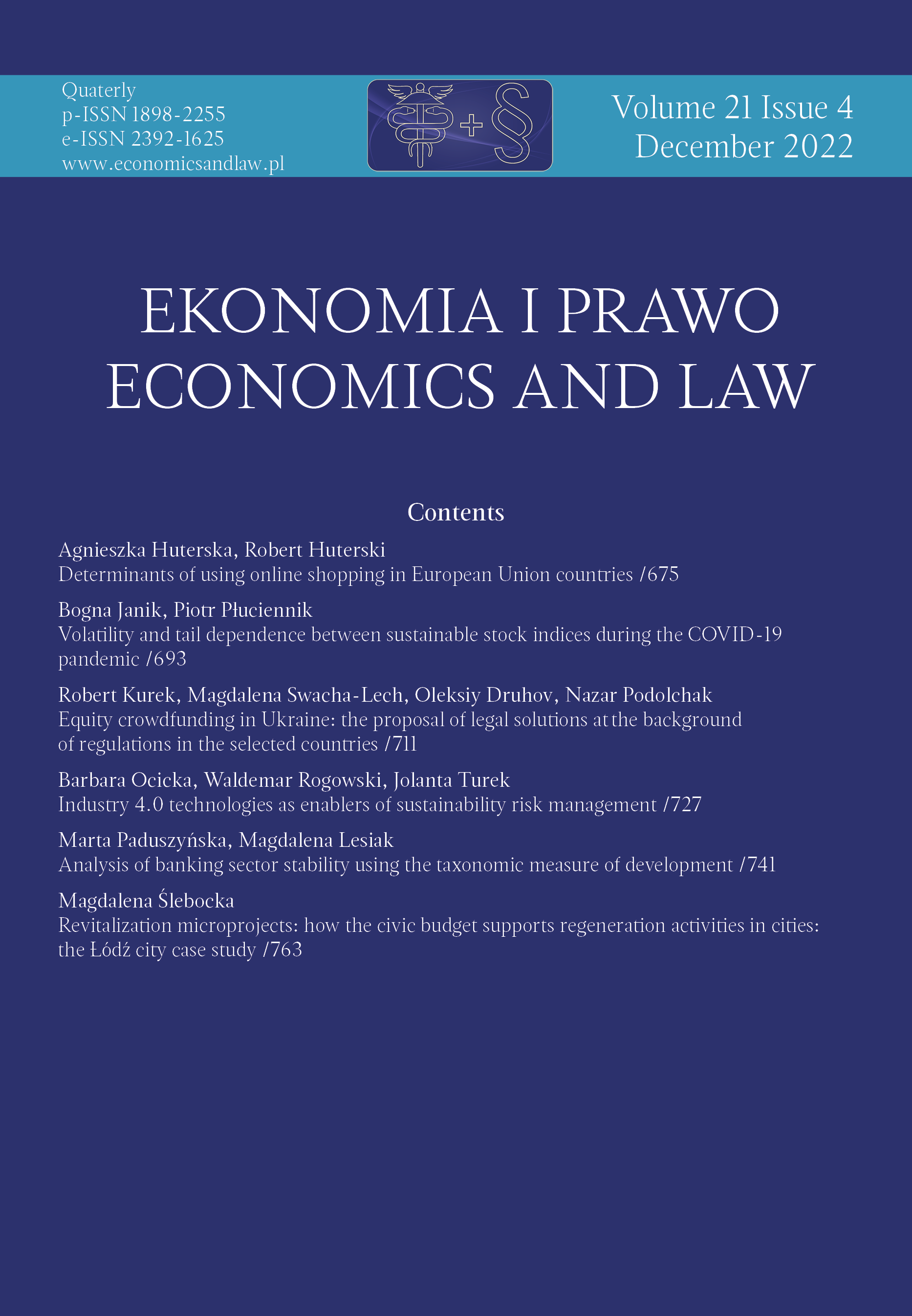Equity crowdfunding in Ukraine: the proposal of legal solutions at the background of regulations in the selected countries
DOI:
https://doi.org/10.12775/EiP.2022.038Keywords
equity-based crowdfunding, Ukraine, regulationsAbstract
Motivation: The capital market developing in Ukraine is not capable of filling the capital gap for innovative ventures presenting high risk of failure, therefore equity crowdfunding can be perceived as a significant alternative offering a source of funding for enterprises, primarily in relation to the development of initiatives and projects, the value of which has not yet been verified by the market (the so-called startups). At the same time, it should be remembered that one of the important factors responsible for the development and popularization of crowdfunding in a particular country is the development of the explicit crowdfunding regulation.
Aim: The aim of this article is to propose legal solutions dedicated to ECF in Ukraine, developed based on the analysis of legal regulations in the selected countries. The model of legal regulations proposed by the authors was assessed by the experts from Ukraine. The study consisted in an expert assessment of the suggested model solution being the result of legal regulations regarding the functioning of crowdfunding in the selected countries worldwide, an identification of the desired changes in legal regulations in Ukraine, and the assessment of the potential for the development of equity crowdfunding as the source of funding for the Ukrainian companies.
Results: The results of the conducted research show that as many as 90% of the Ukrainian experts agreed with the proposed legal solutions dedicated to equity crowdfunding and described the developed legal model as suitable for the Ukrainian market. At the same time, the vast majority of respondents (85%) acknowledged that the scope of regulations proposed in the model is appropriate, without indicating the need for introducing regulations in other areas.
References
Agrawal, A., Catalini, C., & Goldfarb, A. (2016). Are syndicates the killer app of equity crowdfunding. California Management Review, 58(2), 910–921. https://doi.org/10.1525/cmr.2016.58.2.111.
Ahlers, G.K., Cumming, D., Günther, C., & Schweizer, D. (2015). Signaling in equity crowdfunding. Entrepreneurship Theory and Practice, 39(4), 955–980. https://doi.org/10.1111/etap.12157.
Bandura, J. (2020). Limity zbiórek equity crowdfundingu. Retrieved 13.01.2022 form https://crowdzone.pl/limity-zbiorek-equity-crowdfundingu.
Belleflamme, P., Lambert, T., & Schwienbacher, A. (2013). Individual crowdfunding practices. Venture Capital, 15(4), 313–333. https://doi.org/10.1080/13691066.2013.785151.
de Buysere, K., Gajda, O., Kleverlaan, R., Marom, D., & Klaes, M. (2012). A framework for European crowdfunding. Retrieved 12.01.2022 from https://www.fundraisingschool.it/wp-content/uploads/2013/02/European-Crowdfunding-Framework-Oct-2012.pdf.
Estrin, S., Gozman, D., & Khavul, S. (2018). The evolution and adoption of equity crowdfunding: entrepreneur and investor entry into a new market. Small Business Economics, 51(2), 425–439. https://doi.org/10.1007/s11187-018-0009-5.
European Commission. (2015). Crowdfunding: mapping EU markets and events study. https://doi.org/3010.2874/37466.
Gałkowski, P. (2016). Włoska regulacja społecznościowego finansowania udziałowego przedsiębiorstw innowacyjnych za pośrednictwem portali internetowych: zarys modelu. Transformacje Prawa Prywatnego, 4, 5–21. http://dx.doi.org/10.26106/0mt9-9g33.
Hossain, M., & Oparaocha, G.O. (2017). Crowdfunding: motives, definitions, typology and ethical challenges. Entrepreneurship Research Journal, 7(2), 20150045. https://doi.org/10.1515/erj-2015-0045.
Hryhoruk, P., & Prystupa, L. (2017). Crowdfunding as an innovative technology for financing and promoting business projects. In M. Bezpartochnyi (Ed.), Mechanisms of interactions between competiveness and innovation in modern interactional economic relations (pp. 135–144). ISMA University.
James, W.R. (2021). Changes in SEC Regulation A and Regulation D. Retrieved 13.01.2022 from https://www.kaplanfinancial.com/resources/industry-updates/changes-in-sec-regulation-a-and-regulation-d.
Kordela, D. (2016). Crowdfunding udziałowy w Stanach Zjednoczonych. Annales Universitatis Mariae Curie-Skłodowska Sectio H Oeconomia, 50(4), 237–244. http://dx.doi.org/10.17951/h.2016.50.4.237.
Morin, N., Rizvi, Z., Rawle, G.L., & Hallé-Hannan, D. (2021). Canadian securities regulators adopt harmonized crowdfunding rules to promote access to capital for startups. Retrieved 12.03.2022 from https://www.dwpv.com/en/Insights/Publications/2021/New-Harmonized-Crowdfunding-Rules-for-Startups.
Myszkiewicz, M. (2015). Nowe regulacje crowdfundingu w Niemczech. Retrieved 2.02.2022 from http://b2-biznes.pl/nowe-regulacje-crowdfundingu-w-niemczech.
Peoplesproject.com. (2022). Military. Retrieved 1.03.2022 from https://www.peoplesproject.com/en/projects/#military-en.
Rau, P.R. (2020). Law, trust, and the development of crowdfunding. SSRN Electronic Journal. https://doi.org/10.2139/ssrn.2989056.
Regulation (EU) 2017/1129 of the European Parliament and of the Council of 14 June 2017 on the prospectus to be published when securities are offered to the public or admitted to trading on a regulated market, and repealing Directive 2003/71/EC (OJ L 168, 30.6.2017).
Regulation (EU) 2020/1503 of the European Parliament and of the Council of 7 October 2020 on European crowdfunding service providers for business, and amending Regulation (EU) 2017/1129 and Directive (EU) 2019/1937 (OJ L 347, 20.10.2020).
SEC. (2021). Regulation crowdfunding. Retrieved 20.02.2022 from https://www.sec.gov/smallbusiness/exemptofferings/regcrowdfunding.
Tolub, N. (2021). Crowdfunding in Ukraine: how it works and how it can be of use to business. Retrieved 12.03.2022 from https://en.thepage.ua/business/crowdfunding-ukraine-what-it-is-what-platforms-exist-and-what-are-the-benefits.
UKCFA. (2014). Code of conduct. Retrieved 20.02.2022 from https://www.ukcfa.org.uk/join-us/code-of-conduct.
Vismara, S. (2019). Sustainability in equity crowdfunding. Technological Forecasting and Social Change, 141, 98–106. https://doi.org/10.1016/j.techfore.2018.07.014.
Vulkan, N., Astebro, T., & Sierra, M.F. (2016). Equity crowdfunding: a new phenomena. Journal of Business Venturing Insights, 5, 37–49. https://doi.org/10.1016/j.jbvi.2016.02.001.
Wiśniewski, T.P. (2019). Determinanty rozwoju rynku crowdfundingu inwestycyjnego w Europie. Studia BAS, 1(57), 77–103. http://dx.doi.org/https%3A//doi.org/10.31268/StudiaBAS.2019.05.
Downloads
Published
How to Cite
Issue
Section
License
Copyright (c) 2022 Robert Kurek, Magdalena Swacha-Lech, Oleksiy Druhov, Nazar Podolchak

This work is licensed under a Creative Commons Attribution-NoDerivatives 4.0 International License.
Stats
Number of views and downloads: 854
Number of citations: 0
